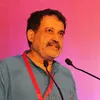SBI Chairman Rajnish Kumar praises PM Modi for deep-rooted reforms; asks for 'a little bit of patience' for economic growth
SBI Chairman Rajnish Kumar has a great view of the economy from his position. In this part of a series of articles based on an exclusive interview with him, YourStory finds out what is in store for the Indian economy in the coming days.

YourStory Founder and CEO Shradha Sharma in conversation with SBI Chairman Rajnish Kumar
The economic slowdown cannot be downplayed, with signs showing up across industries and sectors. But while the numbers speak for themselves, there is little need to be pessimistic, says State Bank of India Chairman Rajnish Kumar.
Speaking to YourStory Founder and CEO Shradha Sharma, he explains why we need to have patience to ride out the downturn, which has also been spurred by the Narendra Mod government's deep-rooted reforms that came at one go. He refers to GST, Real Estate Regulation and Development Act, Insolvency and Bankruptcy Code, the demonetisation drive, stating that they would be key as India moves towards economic growth.
However, he feels that people now know how to do business and things will pick up. “There will be a different kind of business (environment) and growth in India going forward,” he opines.
Rajnish also points to the global downturn that has exacerbated the current economic situation. “There is an economic slowdown in every major economy. So, the global environment also is not very supportive of economic growth. It is having an impact on exports and that's why this situation demands some steps be initiated,” he explains.
On indicators of some improvement in the economy, Rajnish confirms that October as a month saw some activity and a lot of demand for consumer goods, given the festival season. “November has just started. We need to wait and then take stock of activity in three months,” he adds.
As far as government’s long-term strategy of becoming a $5 trillion economy is concerned, Rajnish believes that the revival of investment, especially in the private sector, is critical to achieve the target. “This investment is what we call ‘gross capital formation’, and it is absolutely essential that the private sector participates in it,” he adds.
The SBI Chairman further explains that the government’s primary job in this case would be to create a hassle-free investment journey to help revive the economy. “We have already seen a lot of improvement in terms of ease of doing business,” he says, adding that those states that are not considered very progressive should be given a fillip to attract investment.
Recently, India jumped 14 places to occupy the 63rd position on the World Bank’s Ease of Doing Business ranking, riding on the Make In India scheme and attractive reforms for foreign investments.








